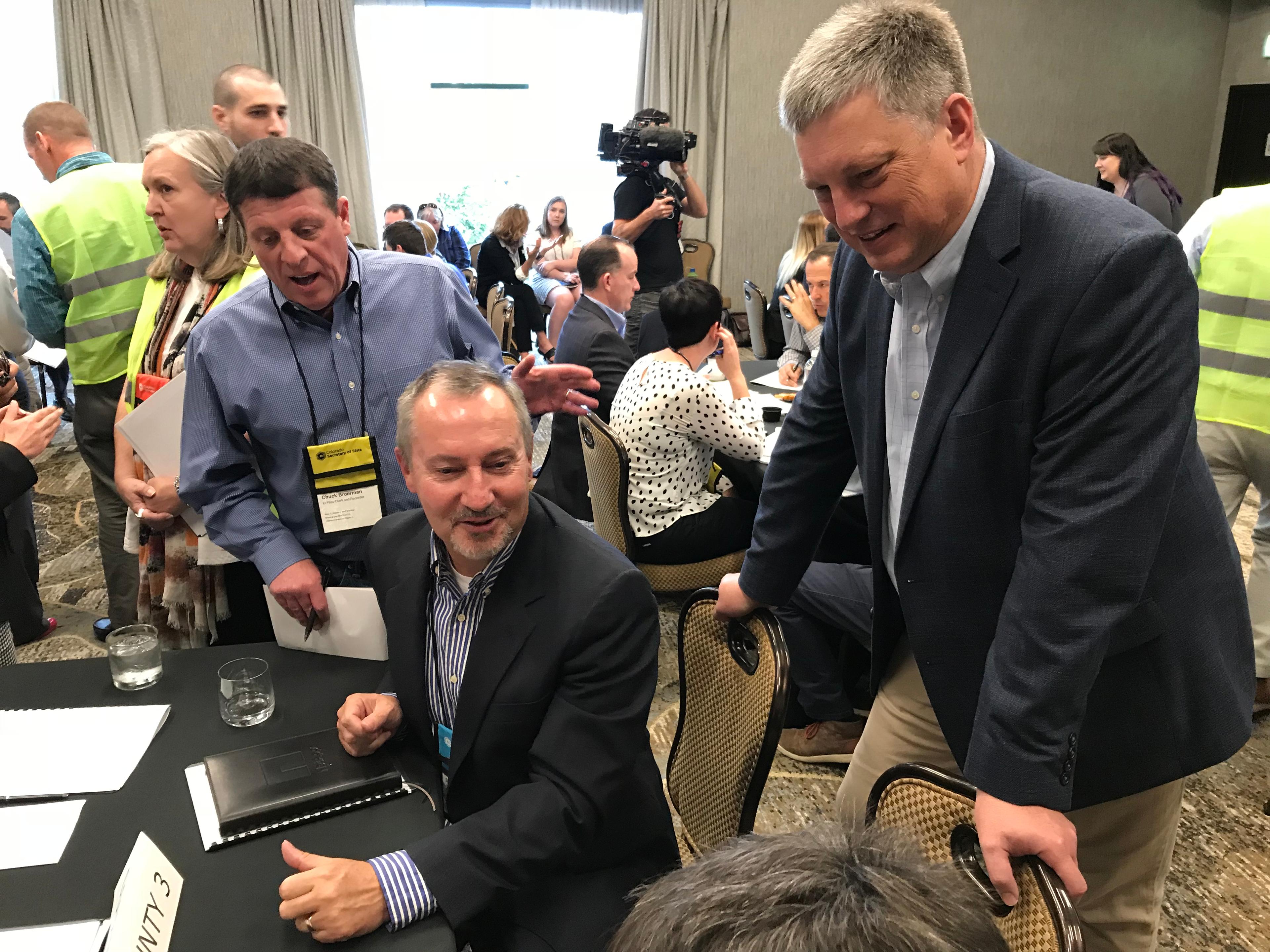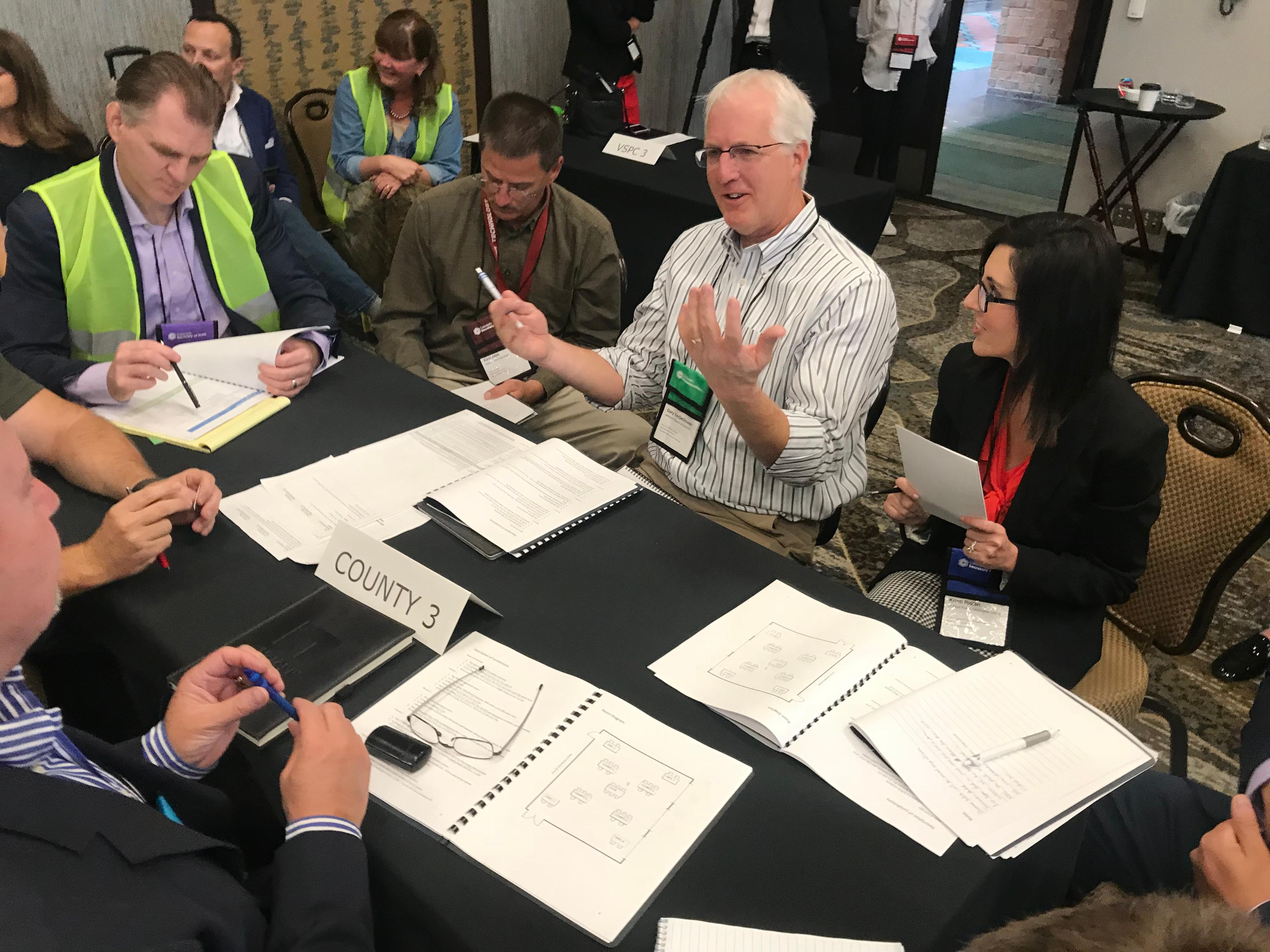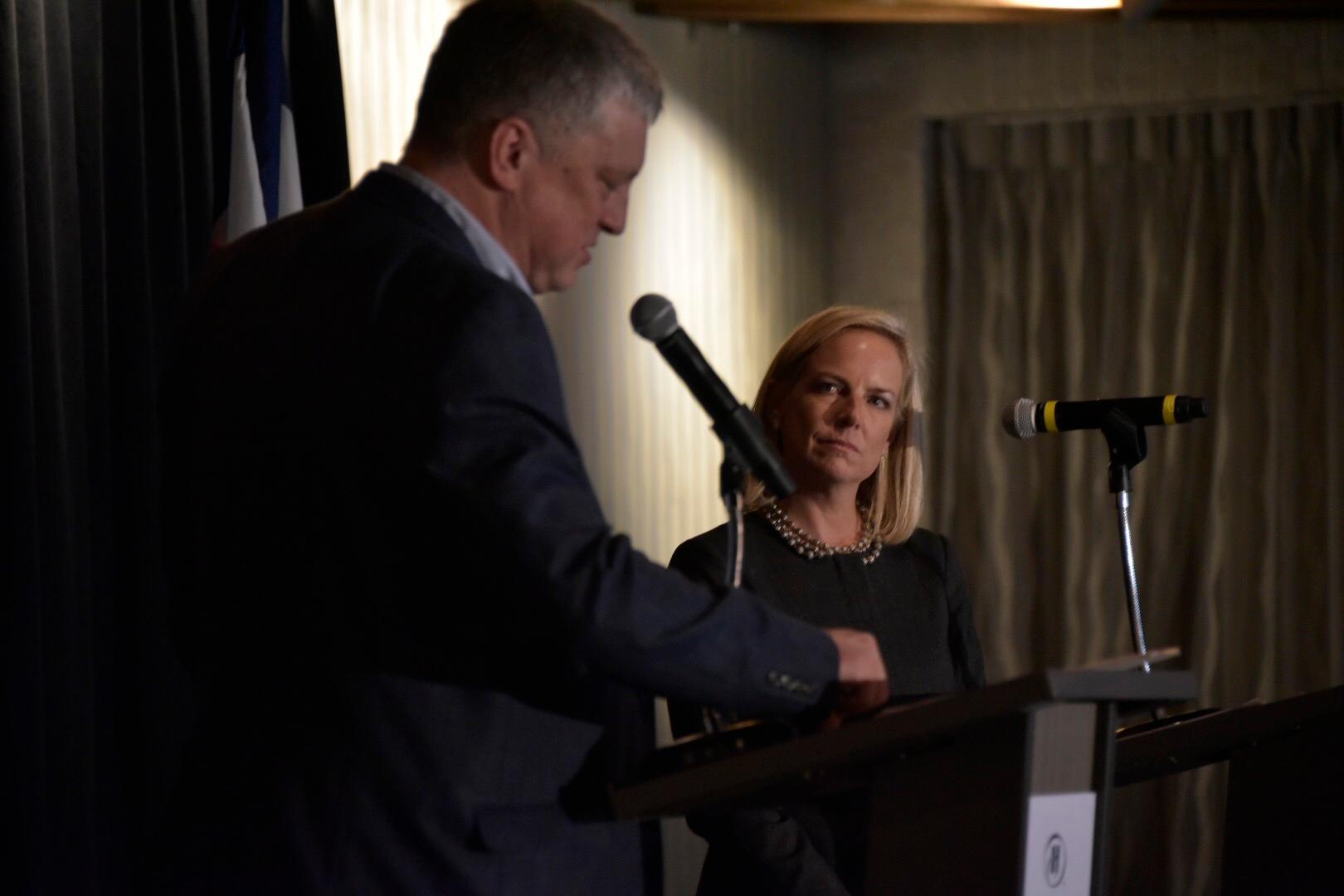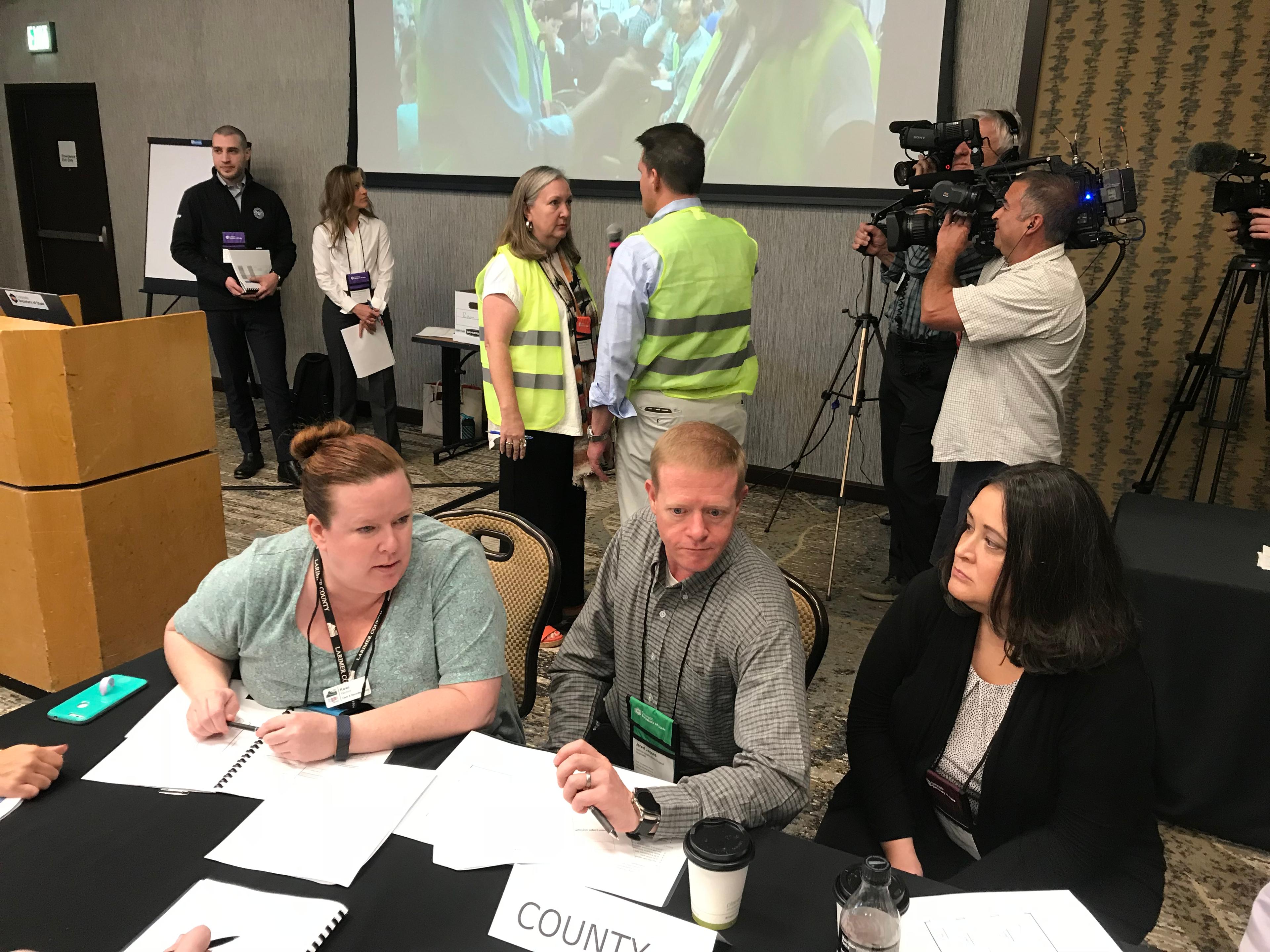Inside little conference rooms at the Hilton Denver Inverness in Englewood on Thursday, every state and county election official’s worst nightmares unfolded at a rapid pace.
There were tables scattered throughout each room. At each table sat election directors, communication managers, county clerks and IT supervisors engaging in lighting-fast brainstorming sessions to figure out how to handle an election crisis. News crews were there to demand answers.
None of it was real, of course. It was all part of a big tabletop exercise, a sort of emergency drill to give election office staff from 63 out of the state's 64 counties a chance to practice handling potential issues. The focus was on cybersecurity.
“It really helps people think through how they would approach, you know, certain situations,” said Amber McReynolds, the former Denver Director of Elections, who worked as a moderator. “The goal is to better train and prepare election officials to be ready for things that might happen.”
It was fake chaos that was actually pretty chaotic. There were people constantly talking over one another, simulating how counties would be strategizing in real time while the state’s office worked to figure out what the hell was going on.
Each table represented a county and had people with different roles. There was also a “state” table and another representing a voting center.
Secretary of State Wayne Williams said it’s the first time Colorado has ever hosted such a training exercise. There were more than 200 people in attendance on Thursday. Among them were out-of-state folks who were there to observe, including New Jersey Secretary of State Tahesha Way and New Mexico Secretary of State Maggie Toulouse Oliver.
U.S. Department of Homeland Sec. Kirstjen Nielsen, whose department oversees elections security, served as keynote speaker during Thursday’s lunch. DHS staffers also attended the training sessions.
Williams said he was “ecstatic” over Thursday’s turnout, which was voluntary for county officials.
“I thought it was important to bring this training to local election officials, who are the ones who actually have to deal with issues when they arise,” Williams said. “We’ve got a state where local election officials are in charge of the election process. We want to make sure they have the tools to be ready to deal with whatever crazy things may happen.”
The event included two exercises: one leading up to the election and one on election day.
Jefferson County Elections Director Gary VanDeStouwe sat in County 3. He served as “an elections staffer” for a ski-town community whose demographics included 27,000 registered voters, predominately white but with some Latino voters. It had four voting centers.

During the pre-election exercise, his staff had to deal with issues happening within a few months of the election including:
- A report that an 11-year-old girl in Los Angeles had managed to hack into Colorado’s election system, flipping votes.
- A transformer in Denver blowing up near the mailing facility where ballots are mailed out, causing a delay.
- A ballot machine being hacked and ballots from people whose name end with Z being deleted.
In the election day exercise, County 3 dealt with a political doozy: The County Clerk’s Twitter account was hacked and a message suggesting strong opposition toward a political party was released.
“Oh my gosh,” said County 3 “public information officer” and actual El Paso County Public Information Officer Kristie Ridlen after being notified.
Some of the scenarios are based on real-life situations, like rumors being spread via social media.
Misinformation can spread fast if left unchecked.
VanDeStouwe said the mock tweet was an example of that. It requires them to “get good information out,” and focus on damage control. It wouldn’t directly affect elections in a way that, say, hacking a voting machine would, but VanDeStouwe said it’s still something they need to be prepared to fix.
“It was actually fairly realistic,” VanDeStouwe said about the two exercises. “A lot of what happened before election day has already happened in this election process. It’s things we’ve already dealt with.”
While the focus was on cybersecurity, VanDeStouwe said a majority of Coloradans return their ballots via mail. He estimates voting centers usually have about 7 percent turnout, with 93 percent of elections in Colorado taking place over the mail-in process.
“This is actually very focused on a very small amount of the voters,” VanDeStouwe said. “Every vote is important, but we do a lot of planning because this is where there is network exposure and there is interactions and there is physical exposure to any of the equipment.”
Williams said they’re not always sure what kind of issues they could end up facing before or after elections, but he said being prepared to deal with some can make you prepared for others.
“I think in the world that we live in today, that it’s become increasingly apparent that you have to be ready for a host of things that you may have never dreamed of years ago,” Williams said.

Williams said Thursday’s event is especially important for a state where a record 2.9 million people cast ballots during the last presidential election.
“That’s important because we want to make sure that Coloradans know their vote is secure, that they’re going to vote,” Williams said. “We want to make sure people know that they can vote, that their vote is going to be counted accurately.”
The training and the paper ballots all provide assurance, he said.
Secretary Nielsen lauded Colorado's election system, which already has in place measures she wants all states to take.
Nielsen mentioned that Colorado already has auditable records for all votes, which she's pushing for nationwide: "If you don't mind, we'd love to continue to use you as a best-case example of what other states can adopt."
“You’re the guardians of these critical systems and I want to thank you for the hard work that you do year-round to ensure that on election day, we’re ready,” Nielsen added, reffering to elected officials. “And that’s from all kinds of threats.”
Her appearance was a bit of a surprise Thursday since it was mostly kept quiet; reporters weren’t notified and her name wasn’t listed on the event program.

Nielsen — who was born in Colorado Springs — said that once it became clear Russians attempted to target the U.S. elections in 2016, the country wanted action. She said Russians were “without question” actively seeking access to the country’s election infrastructure.
“There’s a lot of confusion about what happened,” Nielsen said, adding there were mischaracterizations and false information floating around. “The fact is, and this bears repeating, no votes were altered.”
Concerns over elections are still pretty high among Americans, Nielsen said, though she said there haven't been any signs of a similar attempt so far. It’s true among U.S. allies, including Australian officials, with whom she visited recently.
“Their main adversary, if you will, is China, in the case of what they worry about elections, where we’re much more worried about Russia,” Nielsen said. “They’re seeing very similar things to what we’re seeing.”
Nielsen didn’t directly mention her boss, President Trump, who famously made unfounded claims about voter fraud after the 2016 election. His administration has denied any collusion between his campaign and Russia. These allegations are still being investigated by Special Counsel Robert Mueller.
“We learned a lot of valuable lessons in 2016 and I think you would agree we’re miles from where we were,” Nielsen said. “I think that’s important to continue to actively message to our citizens so that they do have confidence that we have taken this seriously and that we continue to act.”












